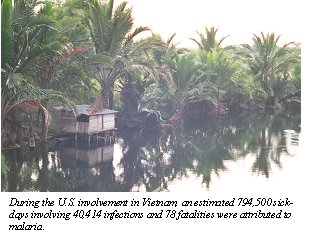
 Product Name: Sulfadoxine-Pyrimethamine
Product Name: Sulfadoxine-PyrimethamineCommercial Name: Fansidar Application: Antimalarial drug for treatment Date of Licensure: 1983 Type of Product: : folic acid inhibitors Company of manufacture: : Hoffman-LaRoche Reasons for development:Beginning in 1961, chloroquine-resistant malaria was noted in Columbia as well as U.S. service members in Vietnam. During the U.S. involvement in Vietnam, an estimated 794,500 sick-days involving 40,414 infections and 78 fatalities were attributed to malaria. P. falciparum parasites resistant to the available antimalarial drugs such as chloroquine (Journal of Antimicrobial Chemotherapy 1995:36:857-872) were encountered. At the same time, use of the residual insecticide DDT was discontinued because of insecticide-resistant mosquitoes and adverse environmental effects. Role of DoD:: The U.S. Army established an intensive malaria research and development program during the Vietnam War to develop new prophylactic and therapeutic drugs for military use. This research was coordinated through the Division of Experimental Therapeutics at the Walter Reed Army Institute of Research (WRAIR) now located in Silver Spring, Maryland.  Faced with the difficulties in creating treatments for chloroquine-resistant malaria, scientists of the United States Army Antimalarial Drug Development Program explored the effect of combinations of drugs that block folic acid on malaria parasite growth. Malaria parasites are sensitive to folic acid deficiency. Folic acid is vital to the synthesis of nucleic acids which are prerequisites for cell multiplication. Compounds that have an anti-folic acid effect inhibit the replication of malaria parasites. Sulfadoxine and pyrimethamine interfere with folic acid synthesis at two different steps in parasite replication, so the combination treatment results in a higher degree of anti-folic acid activity compared to when only one of the drugs is given. Primethamine was first created by Burroughs Wellcome in 1950 during a research effort to develop anticancer agents. The Walter Reed Institute Army Institute of Research (WRAIR) was involved in clinical trials and FDA approval for the sulfadoxine-pyrimethamine combination (known by the commercial name of Fansidar) to be used to prevent malaria. However Fansidar may cause serious adverse allergic reactions involving skin, liver and blood. Also, the emergence of widespread resistance to the drugs has limited the usefulness of Fansidar as long-term prophylactic agents.
Faced with the difficulties in creating treatments for chloroquine-resistant malaria, scientists of the United States Army Antimalarial Drug Development Program explored the effect of combinations of drugs that block folic acid on malaria parasite growth. Malaria parasites are sensitive to folic acid deficiency. Folic acid is vital to the synthesis of nucleic acids which are prerequisites for cell multiplication. Compounds that have an anti-folic acid effect inhibit the replication of malaria parasites. Sulfadoxine and pyrimethamine interfere with folic acid synthesis at two different steps in parasite replication, so the combination treatment results in a higher degree of anti-folic acid activity compared to when only one of the drugs is given. Primethamine was first created by Burroughs Wellcome in 1950 during a research effort to develop anticancer agents. The Walter Reed Institute Army Institute of Research (WRAIR) was involved in clinical trials and FDA approval for the sulfadoxine-pyrimethamine combination (known by the commercial name of Fansidar) to be used to prevent malaria. However Fansidar may cause serious adverse allergic reactions involving skin, liver and blood. Also, the emergence of widespread resistance to the drugs has limited the usefulness of Fansidar as long-term prophylactic agents. |
| Chloroquine | Primaquine | Sulfadoxine | Mefloquine | Doxycycline | Halofantrine | Atovaquone |
